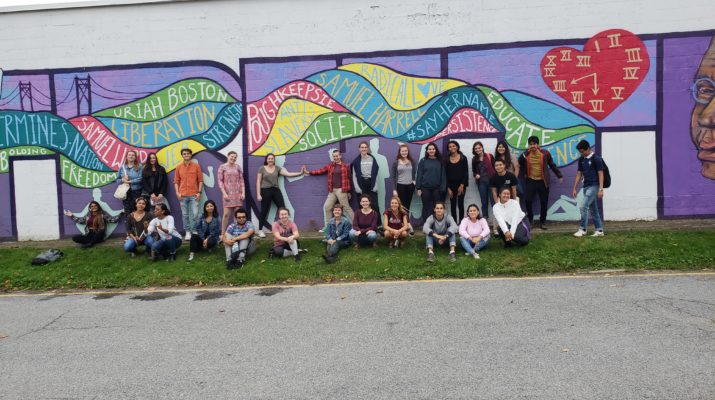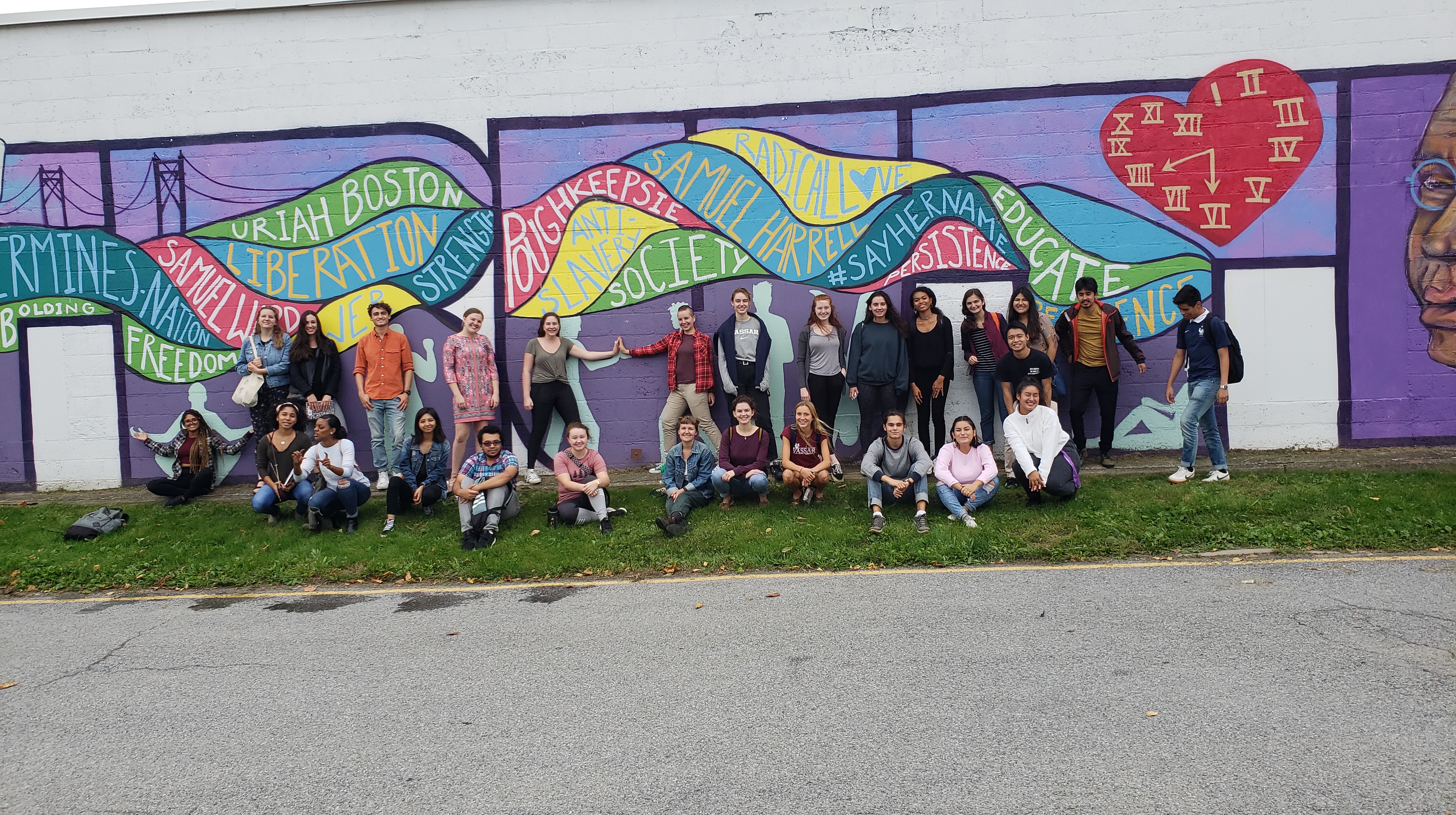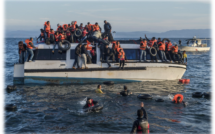

This is part of our special feature on forced migration, Narration on the Move.
A spotlight on Vassar College.
Humanities has sometimes been slower in adapting, perhaps given the fact that we teach content dedicated to social justice. Format oftentimes takes a back seat to content. In what follows, I describe how some of us in multi-disciplinary programs have been experimenting with pedagogical initiatives focused on the intersection of migration, community and language justice: Conversations Unbound (CU), and Building Inclusive Communities with Latinx Poughkeepsie (BICLP).
Like many of my colleagues in Iberian Peninsular studies, I have been teaching about representations of migration in literature and film for the past two decades. Displacement defines Spanish twentieth and twenty-first century history: the exile of civil war refugees in the 1930s across the Atlantic into Spain; the wave of guest workers in the 1950s-60s into Germany and Switzerland; or the consistent flow of Moroccans and North and Sub-Saharan Africans into Europe in the 1990s. The more I taught about migration, the more convinced I became of the need for comparative analysis across different borders and eras. Understanding how states and private corporations act together to build and militarize walls led us to study the states of exception between the U.S/Mexico, Spain/Morocco and Israel/Palestine. Further multi-disciplinary analysis showed a way to counter the incomplete characterization of migration and borders in the local and global press by teaching narratives that gave more voice.
These narratives featuring more direct testimony of migrant voices were not enough. As the immigration “crisis” began deluging us daily with fear-mongering masked as security concerns, DACA’s abrupt end made migration a campus issue, while in our own small city, deportations of folks we knew were shredding our community. During the media saga covering the 7,000-person caravan in 2018 that traversed Mexico, the local response to the President’s deployment of 5,000 troops to the border was divided. Despite a thriving community of Spanish speakers, it was clear that the anti-immigrant media had impacted public opinion in our school and voting districts. Despite a radical curriculum, the books and screens were only getting us so far; they weren’t enough to disrupt the mediatic flow of facile anti-immigrant bias.
Interactive, imaginative and participatory as our classroom technologies have allowed us to become, as Claire Kramsch writes, we began to see close up how “there has never been a greater tension between what is taught in the classroom and what the students will need in the real world once they have left the classroom” (296, 2014). Like in many campuses across the US, Vassar made strides toward increasingly diverse faculties and student bodies, greater awareness of and commitment to affirmative action policies, and yet deeper fissures remained. Feelings of social alienation, bullying, calling-out, and backlashes against affirmative action erupted in stark contradiction to our classrooms where students spoke eloquently and ultimately theoretically, about inclusivity. Technologies of communication, while offering us greater connectivity, can serve to reinforce stereotypes and racialized difference (Nakamura; Kern 339).
In light of anti-immigrant rhetoric and increasing violence disproportionately targeting people of color, we urgently needed communication tactics that disrupt the border-building around social identities. We needed pedagogical models that enabled more meaningful dialogue with students and community partners who carried the burden of representation under a repressive racial regime.
Conversations Unbound (CU) offers a language justice program that brings together students and individuals geographically and culturally separated, and seeks to recognize forcibly displaced individuals by paying them to practice Arabic or Spanish with our language students. Through CU, tutors who had experienced forced migration met through the online interface, italki (through a connection with a Vassar alum) to converse in the target language, but more importantly, to enable intercultural learning among individuals who might never encounter one another in real life. Tutors were not academics but were nevertheless treated as knowledge producers and participants in learning. CU, an unapologetic politicization of language teaching, worked to re-channel the energies of our institutions away from donor models toward a commitment to displaced individuals. What better way to honor Paulo Freire’s invitation to teachers to reconcile “the poles of the contradiction” between teachers and students in order to liberate education from an economic narrative (Freire 72)?
Building Inclusive Communities with Latinx Poughkeepsie (BICLP) links in real life (RL) students on campus who might never meet. Both models provide opportunities for uncoerced, deliberate conversations that allow for meanings “not yet determined” or scripted by economic logic (Deetz and Simpson 142-143). Both focus on inclusive, empathetic, reciprocal engaged conversation—a blend of prompts, and unfacilitated or unscripted moments—as the way to build relationships across racial, cultural and national borders. These pedagogical tools described below offer potential paths to fostering nonhierarchical transcultural relationships that empower both students and local communities, and encourage elite institutions to invest more in social inclusion.
The core communication technology that we use in CU is what also underlies the foundation of BICLP, a course born from radical race and education scholar Colette Cann’s Building Inclusive Communities. Co-taught by a professor and a community organizer specialized in intentional living communities, Jeffrey Golden, BICLP explores best practices for nurturing positive change in our local Latinx community. Each week concentrates on a theme: nurturing intimacy & trust in relationships, proactively engaging dynamics around social identity, power and privilege, and generating effective community change. Readings tackle case studies of effective social justice campaigns. Experiential activities promote empathetic thinking and consciousness around privilege. While some of the personal and interpersonal work can be difficult, developing compassion and deeper understandings of inclusivity and privilege is essential to preparing ourselves for working with and across local communities and institutions.
In Building Inclusive Communities with Latinx Poughkeepsie (BICLP) as with CU, we endeavored to inhabit “slow and deep” learning that counters the economic notion of quick solutions—learning that breaking walls can only happen when students trust one another enough to be able to ask hard questions around racism, oppression, and privilege. One surprisingly easy-to-implement tool for creating this opportunity is a cell of four students—small learning communities (SLCs)—chosen carefully so as to balance out social identities, that meet twice weekly throughout the course. In the SLC, each student speaks freely for five minutes with no prompt and the other students listen silently for 5 minutes, regardless of whether the speaker speaks or remains silent. In an era of instant productivity, these five minutes of time, without prescription, critique or analysis, transform how students see dialogue.
Students build lasting ties with one another in their SLCs and also develop a relationship with guest speakers from the local Latinx community who visit class weekly and ground our learning. After a guided walk through downtown Poughkeepsie with local Latinx hosts and non-profit organizers, students began to develop strategies for community campaigns around issues that have been identified as priorities by the local Latinx community in a grassroots survey completed in fall of 2018 by one of these same speakers and myself. Emphasizing process over product, student projects are not to be implemented or imposed, but imagined so that students can experience as they themselves said, the many “moving parts” and the vision required for organizing despite the very different origins of activists.
Finally, the course is intentionally bilingual. Taking our cue from language justice initiatives, we try to model a dual lingual space of Spanish and English, where Spanish was not subservient to English, but where language was seen as a tool for communicating, sharing ideas, and ultimately the means for building broader justice movements.
The voices of the students themselves conclude our reflections on these pedagogical initiatives:
The most important learnings and experiences that I take away from this class come from the day that Evelyn Garzetta of Grace Immigrant Outreach came in as a guest speaker. Just seeing another fellow Latina that is strong in her beliefs and successful in her plight for helping immigrants motivated me to continue on with my education and to pursue my dreams. Her life story and the struggles she went through, while personal to her I’m sure many other Latinas can relate to, really hit home. I felt a connection to her, she reminded me of the willful women in my family and I think I needed that without realizing it. Without knowing, she inspired me to keep pushing despite the odds and that the impossible is most definitely possible.
I could not have taken a more important class in my first semester of college. The conversations and experiences I have had in relation to this class have changed my life. Thank you for creating the open environment where this was all possible. Thank you for encouraging us to be vulnerable while never overstepping boundaries. I am forever grateful for having been in this class.
Eva Woods Peiró teaches at Vassar. Her current projects focus on Spanish film magazines of the 1920s and 30s and contemporary Trans-Atlantic digital cinema with particular attention to issues of surveillance and migration. This year she has been focusing on organizing Undoing Racism workshops. Her contribution to this article has been written in the context of the research project CSO2017-85290-P, funded by the Spanish Ministry of Economy and Competitiveness and co-financed by the European Regional Development Fund.
References
Kern, Richard. “Technology as Pharmakon: The promise and perils of the internet for foreign language education.” The Modern Language Journal 98.1 (2014): 340-357.
Kramsch, Claire. “Teaching Foreign Languages in an Era of Globalization: Introduction. The Modern Language Journal 98.1 (2014) 296-311
Nakamura, Lisa. “Cybertyping and the Work of Race in the Age of Digital Reproduction.” Chun, Wendy H. K, and Thomas Keenan. New Media, Old Media: A History and Theory Reader. New York: Routledge, 2006: 317-333
Photo:
Published on October 29, 2019.




